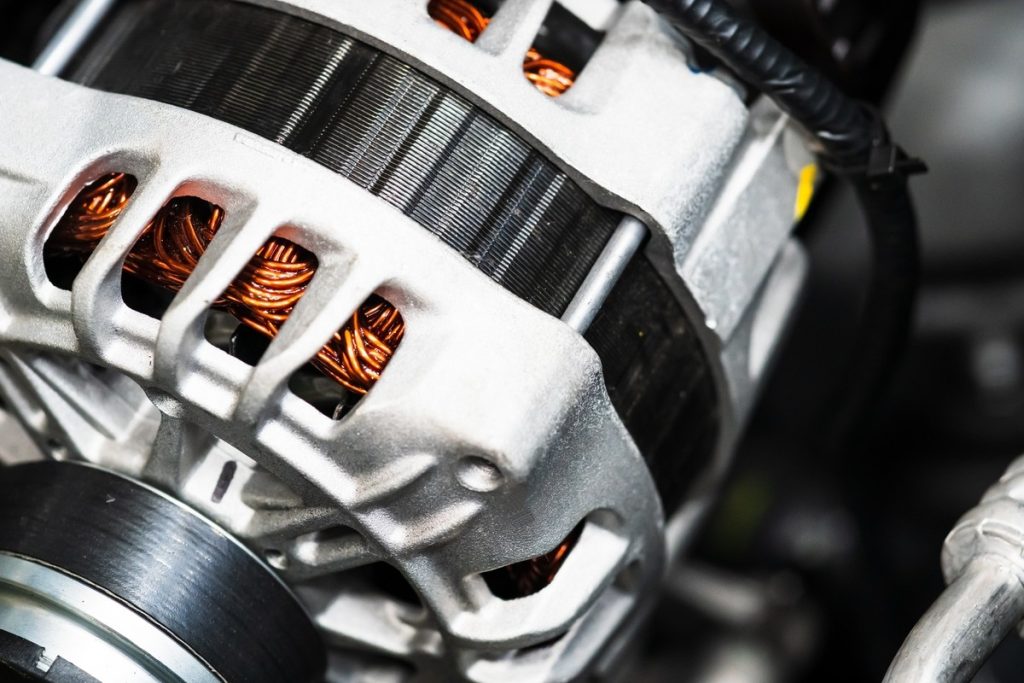What does an alternator do?
The alternator in your car is an essential part of the vehicle’s electrical system. In fact, it generates most of the electricity in your vehicle, powering everything from the radio to the taillights.
It transforms the technicianal energy from the engine shaft into electrical power and supplies it to the onboard power system.
In other words, the engine spins a belt that’s attached to the alternator via a pulley system. This pulley rotates the alternator’s rotor shaft and a surrounding set of magnets that pass around a coil, generating a current.
This alternating current (AC) is channelled into the rectifier, which converts it to the direct current (DC) needed to run your vehicle’s electrical systems and recharge your car battery.
Your car battery stores the excess electricity created and saves it for when you need power while your engine isn’t running, like at start-up
Common Signs of a Failing Alternator
It can be hard to detect a failing alternator because many of the signs of a bad alternator are the same symptoms of a faulty battery. When the electrics in your car don’t work, you tend to immediately look for signs of a dead battery.
It’s hard to figure out what’s wrong with your car’s electrical system when there’s no power.
But there are a few diagnostic tests that show common signs of a failing alternator:
- a light on your dash may tell you whether you have a battery problem or an electrical problem
- faulty electrics, even after you’ve charged or replaced a battery, would indicate that there lies a problem with the alternator
- if your car has difficulty starting, it may be the alternator (not necessarily the battery)
- if you hear grinding or whirring noises, their cause might be due to a whistling drive belt, a belt overheating, or broken pieces within an alternator
- slow-reacting or slow-moving electrics may indicate a problem with your alternator, for example, if your windows move up and down slowly, your headlights aren’t as bright as they should be, or your windscreen wipers are sluggish
- if any of the other electrics are not working (e.g. the air conditioning, media, power steering, etc), you may need to have your alternator tested.
An alternator should last approximately six to ten years, depending on your vehicle and your driving habits. But if your alternator is at least ten years old, it’s a good time to have it tested and/or replaced.
Testing the Alternator
If your car is showing any of the signs above, such as slow-moving windows or windscreen wipers, or you suspect the electronics aren’t working properly, it’s a great idea to have the alternator tested.
A professional technician that is experienced in working with alternators will have the diagnostic tools required to test the alternator.
What happens when a car alternator dies?
The majority of the components in your car are absolutely necessary. Yes, some of them are there for aesthetic purposes only; but by and large, every part is required for your car to run properly. In addition, many parts work interdependently – so if there is a problem with one part, it will affect how the other components operate.
Your car alternator has a definite purpose – to generate most of the electricity in your vehicle needed for the electric windows, wipers, stereo system, heating, air con, headlights, taillights, etc.
So when your car alternator dies, it’s unsafe to drive your car. You may be able to drive a short distance if the battery has enough power in it. But it won’t last long. The electrics will drain the battery and eventually flatten it.
A faulty alternator, therefore, often leads to a dead battery. If left unrepaired, it could cause serious damage to your battery.
Do all alternators fit all cars?
No, not all alternators fit all cars. Your car will need a specific type, so it’s best to consult your owner’s manual. While different alternators may appear similar, they will possibly have different amperage (strength of electrical current) as well as different mounting holes.
A reliable collision repair technician like the team at Mt Roskill Collision Centre can advise you about what your specific car needs.
What should a car alternator charge at?
On average, the alternator of a modern car should have a standard voltage of 13.8 to 14.6 volts. This is enough for the regular operation of the car’s electrical devices, as well as its battery charging.
If the voltage is lower, the battery won’t charge. The onboard network will use your battery power and eventually discharge it, causing it to run flat.
How much is it to replace a car alternator?
Generally speaking, if your alternator is failing, it’s more economical to replace it rather than repair it.
A repair job would involve removing the alternator, diagnosing the problems, disassembling it, installing new components, testing them, and then reinstalling the alternator.
It’s much quicker (therefore, cheaper) to replace a faulty alternator with a new one.
Prices will vary depending on the vehicle you own and if you are replacing with new or used parts. With used parts, the standard alternator replacement cost, including parts and labour, might be between $400 and $800. For a luxury or European model, this might be closer to $1500.
Feel free to give us a call on 0800 227 762 for an estimate.
Call us on 0800 227 762 or email [email protected] for professional and friendly car servicing advice.
